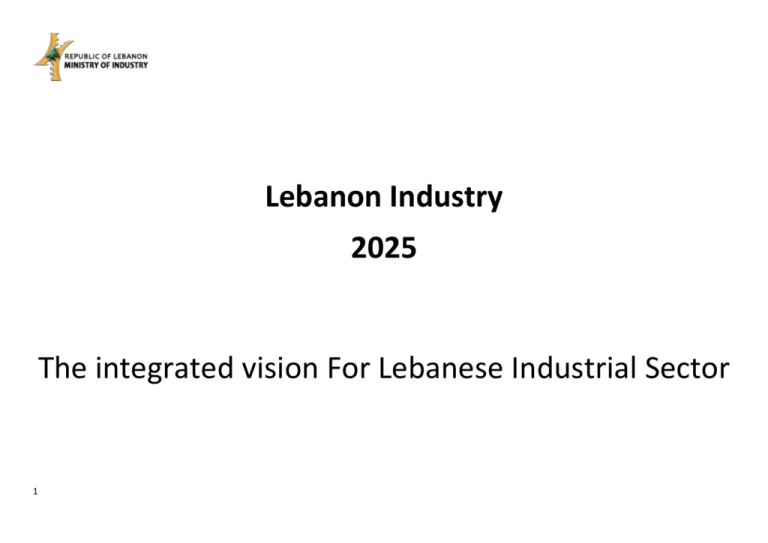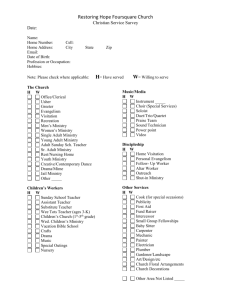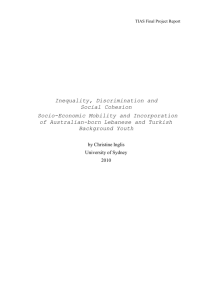Lebanon Industry 2025
advertisement

Lebanon Industry 2025 The integrated vision For Lebanese Industrial Sector 1 Mission: Conducting the Lebanese industrial sector and contributing to its empowerment, activation, protection and development. Vision: Industry that contributes effectively and consistently to the achievement of sustainable development. 2 The integrated vision for the Industrial Sector in Lebanon Lebanon Industry 2025 First: Strategic objectives 1- Definition: Effective, dynamic, and developed Ministry of Industry capable of conducting and leading the industrial sector towards sustained prosperity. Establish new building for the Ministry of Industry headquarters and new locations for its regional departments, capable of accommodating the ministry staff and the related institutions. Sufficient and modern buildings with future outlook, well-equipped to provide best services, ensuring stuff and stakeholders satisfaction. Establish reliable reference of the Ministry of Industry in the field of industrial statistics and information. Strive to lead the Lebanese society into becoming a highly productive and active industrial society. Achieve national economic development and raise living standards. Contribute in reducing trade deficit. Increase Job opportunities steadily. Strive to raise productive capacity of the national industry to be able to provide 50% to 70% of local consumption consumption needs of various sectors. Increase the contribution of the industrial sector to gross domestic product (GDP) to 18%. Preserve and protect the environment. Keep pace with developments, support researches and innovations. 3 2- Risks: 3- Governmental Economic policy. Security and political conditions in Lebanon and its regional environment. Internal and external economic conditions affecting national economy. Lack of commitment by parties and partners to obligations. Diminishing of financial, human and technical resources for the industrial sector. Community resistance (culture, education, conflict of interests, etc…). Opportunities: Upgrading Ministry of Industry establishment law and decrees pertaining to its structure, functions and related implementation decrees. Ability to have a general budget to support the Lebanese industrial sector and an effective budget to the Ministry of Industry to continuously upgrade its equipment, develop and improve its services and performance. Available capacities in the Lebanese economy: geographic position, human resources (expertise, educational level, youth factor…) financial resources, individual initiatives, liberal economy… Public - private Partnership (PPP). Grants, loans and foreign assistance. Technological development and scientific research. Governments political will and economic policies. Ministry of industry tasks and responsibilities. Competence of the administrative and technical staff of the ministry of Industry and related institutions. Joined efforts and coordination among ministries, administrations and governmental Institutions. Lebanese diaspora Favorable foundation for specialization in production and orientations. 4 Increasing convergence between industrial trends and education. 4- Direct influence factors: Positive factors: Geographic position. Success at remaining retracted from direct regional devastation. Arduous success in containing the large number of displaced persons and achieving political accordance to gradually solve the situation. Active social mobility. Negative political balance among the main components and the ensuing tranquility. Ability to create compromised solutions. The increased demand in Arab markets as a result of political destructive transitions. Negative factors: Absence of an integrated, clear and purposeful governmental socio-economic vision. Governmental inability to control and guide. High prices of real estate property. High cost of national labor. High cost of energy. Lack of Political stability. Absence of favorable infrastructure and sufficient required services. Absence of necessary funding for support, protection and investment. Internal and external foreign competition. Small and family-owned companies and production factors. 5 Unavailability of suitable industrial zones. 5- Required equation: Purposeful vision and orientation Active cooperation public- public, public- private Proper product pricing High quality Specialization in production Social mobility to restore balance Added value and creativity Second: Operational objectives 6 Expansion of domestic market by increasing production and reducing imports. Increase industrial exports Increase the competitiveness capacity of the national industry, internally and externally with consistency and steadiness. Increase investment and financing in the industrial sector Encourage green industries Encourage new knowledge Industries Media for the industry First Objective: Expanding domestic market Steps: Organize industrial institutions activities in all regions by: urging the legalization of their status, managing their expansion, and unifying and circulating related general and special conditions that govern their work. Improve the quality of Lebanese products. Keep pace with development. Protect and support national industry to increase its productions and expansion. Encourage national industries preference in the public sector procurement. Organize the existing industrial zones and create new ones in all the Lebanese regions. Support small and medium industrial Enterprises and craftsmanship and help them spread in all the regions. Tools: Accelerate, facilitate and constantly improve the ministry services. Propose draft laws and decrees and issue decisions to unify the legal provisions, to provide best working conditions for the industrial enterprises, and lead them towards the best practices. Collaborate with concerned parties for expeditious processing of industrial licensing. Activate the work of The Lebanese Standards Institution (LIBNOR), The Lebanese Accreditation Council (COLIBAC), The Industrial Research Institution (IRI) and The Lebanese packaging Center (Liban Pack). Encourage continuous industries development of products and means of production to ensure consistency with changing market’s demand. Adopt the national production protection tools in cases of dumping and the increase of imports, and simplify its procedures. Adopt the principle of preference in public tenders and securing more than 10% in favor of national industry. 7 Handling the problems facing the industrial sector through continues coordination with industrial sector representatives, governmental and non-governmental concerned entities (Municipalities, associations, organizations…) to find solutions. Activate ministry’s industrial zones bureau role and supervision and upgrade it to the level of department. Establishment and management of industrial zones board. Work on legislative, operational, promotional, and financial levels to improve SMEs professionalism and expansion by providing necessary funding, encouraging their participation in specialized exhibitions, addition to the tourist map and modernization and regulating text. Develop supporting services of industrial enterprises (transport/restoration and rehabilitation of railways especially the coastline/ports…communication/ infrastructure/financial/ touristic/ technical services/insurance, in addition to various facilities). Second Objective: Increase industrial exports Steps: Activation cooperation with Lebanese delegations abroad, international organizations, foreign governments and embassies operating in Lebanon. Focus on national production marketing by constantly seeking new overseas markets. Encourage the integration with the agriculture, services and trade. Encourage internal industrial tourism by providing its service and technical requirements. Ensure compliance of National industrial products with the advanced local and foreign requirements and standards. Facilitate imports procedures (raw materials, equipment, industrial machinery …) and exports (of products and goods locally made). Reduce transportation, transit fees and financial charges (ports, shipping…). Effective and consistent coordination with customs administration and Ministry of Public Work and Transportation, Ministry of Economy and Trade, Ministry of agriculture, and Ministry of finance. 8 Tools: Strive to Find appropriate sources for raw materials and new markets for Lebanese goods and find solutions for trade barriers and problems through coordination with foreign embassies in Lebanon and Lebanese missions abroad. Enhance cooperation with Ministry of Foreign Affairs and Emigrants to benefit from the activities and information of Lebanese missions in foreign countries. Sign new agreements to expand Lebanese products markets. Work on disseminating and implementing specifications and trading terms to simplify exports procedure. Encourage the private sector to establish companies specialized in marketing outside Lebanon and encourage the existing services enterprises supporting exportation (advertising, packaging, studies…). Encourage industrialists participation in training sessions, workshops, seminars, and conferences. Activate the protocol of cooperation with Association of Lebanese Industrialists (ALI). Strengthen and manage interaction with Lebanese diaspora. Coordinate with Ministry of Economy and Trade to take into account the interests of national industry during trading negotiations, shared decision-making, and organizing exhibitions within Lebanon and abroad. Coordinate activities with Ministry of Economy and Trade and Ministry of Agriculture in common areas, especially food safety, and monitoring of violations, inspection and market surveillance… Engage Lebanese universities and faculties specialized in the preparation of studies to enhance exports and unify strategic outlooks. Increase the number of laboratories in all provinces to facilitate the testing procedures (food tests in particular). Organize and /or participate in organizing training sessions in public and private sector about tax exemptions rules and implementation. Strive to reduce the import/export fees collected by Chambers of Commerce, Industry and Agriculture and Ports. Continue to Work on implementing and developing exemption law on industrial products by 50% of the income tax. Work on passing port fees exemption law on industrial machinery and raw materials designed for industrial use (including spare parts for industrial machines). Attempt to incorporate field visits to industries in the Lebanese touristic programs and organize special visits for businessmen. 9 Encourage visits of public and private sectors delegations to foreign specialized entities to exchange experiences and get up-dated on developments. Third Objective: Increase competitiveness of the national industry Steps: Encourage national industries to specialize in high added value production (programming, nanotechnology, mechatronics, electronics, fashion design, professional leather industry, assembly and manufacturing industry, traditional national food industry, medicine, alternative energy, jewelry, industrial equipment, cosmetics, medical herbs and essential oils, perfume, biochemistry, industrial chemistry, petrochemical industry…). Encourage industrial integration enterprises internally and externally. Develop the design components (packaging, packing, storage, display…) of Lebanese products. Activate public - private partnership. Work on activating the quality-related entities (metrology, standards, conformity assessment, QUALEB, ELCIM…). Encourage the activities of all institutions dealing with the industrial sector (Industrial Research Institute IRI, LIBNOR, and COLIBAC, research centers). Promote vocational training within factories and industrial areas. Encourage merging among Industries. Reduce production cost: lower the cost of capital (reduced interests, soft loans, fees and expenses, grants, costs of construction and investment: real estate…) and production cost (energy efficiency, computerization, machinery modernization, labor, advanced management, alternatives for the means of production). Tools: 10 Strive to provide industrial statistics and indicators, economic studies, consultations to industrial enterprises and related specialized governmental agencies. Collaborate with industrialists and sector unions to benefit from Quality Improvement Programs (QUALEB). Enhance the benefit from twinning programs, joint-ventures, partnerships, technical and consultative assistance. Work with the Industrial Research Institute IRI to offer services to small and medium enterprises at affordable prices. Follow-up on passing the geographic indications bill (including description of origin of product) and work on expanding the scope of its implementation. Organize and participate in specialized/professional workshops and training sessions. Follow-up on passing the industries merging bill, promote its benefits, and direct investments towards expansion and integration. Fix three legal years deadline legally for the exceptional re-evaluation of fixed assets and real estate elements. Increase depreciation rate of industrial equipment from 8% to 20% by passing a law to encourage investments. Seek to pass on industrial stimulus bill to encourage the use of alternative and renewable energy. Work to provide alternative energy sources, at lowest cost and more efficient cost (gas, waste incineration, recycling…). Exempt industrial warehouses from value added tax insurance. Collaborate with port authorities to reduce time and fees of good clearance. Fourth Objective: Increase the investment and financing of the industrial sector Steps: Encourage soft loans programs to increase investments in industrial sector. Find a mechanism to ensure foreign industrial investments in Lebanon. Enlisting large industries in Beirut stock market. Increase foreign donations and assistance to the industrial sector. Provide proper conditions and facilitations to attract and direct investments. Tools Collaborate with Banque du Liban and financial institutions (KAFALAT,…), organizations specialized national entities (IDAL) and foreign entities (World Bank, European Bank), to find incentives for financing the industrial sector in 11 particular in the proper industrial fields (industrial areas, alternative energy, clean environment, development and specialized researches…). Collaborate with concerned partners (KAFALAT, insurance companies…) to find a mechanism to guarantee the national and foreign investments in the industrial sector. Attempt to raise the loans ceiling granted by banks through specialized financial institutions and encourage the largest number of industrialists to participate in its programs and in the subsidized loans programs. Strive to amend Income Tax Law and VAT law conveniently and provide incentives. Notify the industrials and share information (seminars, workshops…) about the latest funding programs in collaboration with all parties (Banque du Liban, KAFALAT...). Maximize utility of investments encouragement programs provided by IDAL and Council of Development and Construction Fifth Objective: Encourage Green Industry Steps: Use of renewable and alternative energy and encourage increasing energy efficiency. Encourage recycling. Urge industrial enterprises to obtain ISO 14000 certification environmental management and ISO 26000 on Social responsibility. Collaborate with Ministry of Environment to help industries becoming eco-friendly. Promote the use of green and energy saving buildings. Tools: Adopt the model of industrial cooperation agreement that includes promotion of green industries in the international agreements. Spread the culture of energy conservation and use of alternative energies (workshops, seminars, trainings, media, advertising, …) Empower the activities of Lebanese Cleaner Production Center (LCPC). 12 Participate in the environmental awareness of industrial enterprises (workshops, seminars, training sessions…). Participate in scientific industrial researches to establish and promote the concept of green industry. Work on passing the draft law submitted by the Ministry of Environment to amend article 5-bis and article 7 of the Income Tax Law. Work with various banking and financial entities to provide soft loans for industries and environment eco–friendly buildings. Seek to benefit from international grants specialized for the preservation of environment and alternative energies. Enforce the concept of green industry gradually as one of the ministry‘s conditions for granting services to industrialists operating in Lebanon starting with industrial licensing. Sixth Objective: Encourage New knowledge industry Steps: Encourage innovation and research by assisting with financial, practical and human resources. Support sectors pursuing technological progress. Foster industrial innovations. Encourage creativity capabilities in coordination with concerned governmental and non-governmental entities, universities, associations, unions and research centers. Develop and constantly improve laws that encourage innovation. Tools: Activate research-oriented studies at the Industrial Research Institute IRI, by providing domestic support through legal texts and appropriate budgets and external support through agreements and donations. Support and develop “Lira” program between the Ministry of Industry and the Lebanese Industrialists Association, the National Council for Scientific Researches, and major universities. 13 Participate with universities and research centers and industrialists to establish and develop specialized scientific research centers, particularly in specialized areas considered appropriate by the ministry as a Nano-technology, mechatronics, food industry, pharmaceutical and programming (software), alternative energies, manufacturing of industrial equipment and machinery, cosmetics and perfumes, medicinal herbs, biochemistry, industrial chemistry, recycling industries... Work on passing the draft law of amending Article 5-bis of the Income Tax Law to exempt the expenses of researches and development from income tax. Benefit from foreign experiences through the provision of agreements, scientific cooperation and exchange of experiences. Seventh Objective: Media for the industry sector Steps: Change community culture and perceptions of the national industry. Encourage the consumption of Lebanese industrial products. Link the consumption of the domestic products with patriotism. Promote and establish the direct relationship between industrial production growth and prosperity of the nation. Cooperate with universities, colleges and schools to include information that promote increased awareness about the importance of the Lebanese industry and products consumption in their curriculum. Add to the annual school trips program visits to factories. Encourage factories to visit schools, institutes and universities and to demonstrate production process through illustrated films. Organize specialized industrial exhibitions, workshops, and specialized sectorial seminars. Introduce a free hotline to the ministry in collaboration with the Telecommunications Regulatory Authority. Prepare periodic manuals according at various occasions enclosing information and statistics: about the reality and development plan of the industrial sector in Lebanon, definition of ministry tasks, its powers and achievements, the ministry Services and procedures: Terms and adopted regulatory decisions, Tools: 14 15 the required documents, duration and cost, Projects and software, sources of industrial financing, the legislation governing investment in the industrial sector, guide of factories operating in Lebanon, a promotional guide to the most important Lebanese products, guide of Lebanese products, guide of industrial zones, to be provided electronically on the ministry website or on CDs. Celebrate an annual National industry day and organize corresponding activities. Seek to provide through the local media informative and advertising sequences about the industry for free or at nominal costs; including the audio visual morning shows promotional and awareness sequences for the consumer pertaining to the most important industrial news (awards, successes…). Encourage the production of the documentary programs to boost the industrial advertising. Constantly develop and improve the ministry website by activating requests and complaints follow-up and adding articles and researches to encourage industrial innovation and investment. Promotional advertising for travelers and travel agencies through media and ads, and distribution of free samples for those coming to Lebanon. Encourage the use of public spaces (restaurants, hotels, transport, stations, billboards…) to promote national industry, products and quality.





